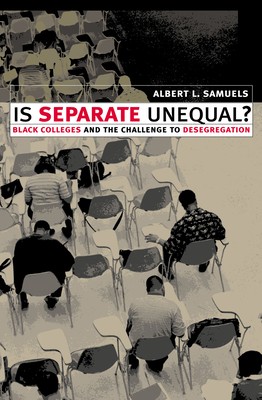
- We will send in 10–14 business days.
- Author: Albert L Samuels
- Publisher: University Press Of Kansas
- ISBN-10: 0700613013
- ISBN-13: 9780700613014
- Format: 16.1 x 23.8 x 2.5 cm, hardcover
- Language: English
- SAVE -10% with code: EXTRA
Reviews
Description
When racial segregation was the rule in southern schools, all-black universities like Jackson State, Alcorn State, and Mississippi Valley State represented the only opportunities for African Americans to obtain a college education. For that reason, the move toward desegregation triggered by Brown v. Board of Education was a mixed blessing for those committed to preserving the traditions of Historically Black Colleges and Universities.
As Albert Samuels observes, Brown's tenet that separate educational institutions are inherently unequal has for nearly half a century forced HBCUs to defend their very right to exist. In this book he reexamines the debate over desegregation and its impact on publicly funded HBCUs, exploring the contradictions and concerns that Brown created for African Americans over four decades and challenging the idea that separate is necessarily unequal. Because the Brown decision has come to embody the American Creed and is now a cultural icon, critical discussion of it can be difficult. Samuels contends, however, that Brown was originally intended to address discrimination against blacks as individuals; when its focus shifted to entire educational systems, the problem became more complicated and exacerbated by the existence of publicly funded HBCUs. In this critique of the liberal perspective on desegregation, Samuels leads readers from the Brown decision to Green v. School Board of New Kent County and on to United States v. Fordice to show how the future of public black universities has been left uncertain at best. For Samuels, economic equality, not segregation, remains the primary obstacle to fully realized citizenship for African Americans. He argues that African Americans' pursuit of equality in higher education can be achieved without defunding programs at these schools and that their funding should be increased in recognition of their role in preserving African American culture. Is Separate Unequal? suggests that the application of the American Creed to the African American experience is problematic if the historical and cultural differences between blacks and whites are not taken into account. As new affirmative action rulings from Grutter v. Michigan take effect, Samuels's study offers another view of desegregation to show that the real integration needed is one that integrates tax dollars with the underfunded budgets of HBCUs.EXTRA 10 % discount with code: EXTRA
The promotion ends in 17d.00:24:18
The discount code is valid when purchasing from 10 €. Discounts do not stack.
- Author: Albert L Samuels
- Publisher: University Press Of Kansas
- ISBN-10: 0700613013
- ISBN-13: 9780700613014
- Format: 16.1 x 23.8 x 2.5 cm, hardcover
- Language: English English
When racial segregation was the rule in southern schools, all-black universities like Jackson State, Alcorn State, and Mississippi Valley State represented the only opportunities for African Americans to obtain a college education. For that reason, the move toward desegregation triggered by Brown v. Board of Education was a mixed blessing for those committed to preserving the traditions of Historically Black Colleges and Universities.
As Albert Samuels observes, Brown's tenet that separate educational institutions are inherently unequal has for nearly half a century forced HBCUs to defend their very right to exist. In this book he reexamines the debate over desegregation and its impact on publicly funded HBCUs, exploring the contradictions and concerns that Brown created for African Americans over four decades and challenging the idea that separate is necessarily unequal. Because the Brown decision has come to embody the American Creed and is now a cultural icon, critical discussion of it can be difficult. Samuels contends, however, that Brown was originally intended to address discrimination against blacks as individuals; when its focus shifted to entire educational systems, the problem became more complicated and exacerbated by the existence of publicly funded HBCUs. In this critique of the liberal perspective on desegregation, Samuels leads readers from the Brown decision to Green v. School Board of New Kent County and on to United States v. Fordice to show how the future of public black universities has been left uncertain at best. For Samuels, economic equality, not segregation, remains the primary obstacle to fully realized citizenship for African Americans. He argues that African Americans' pursuit of equality in higher education can be achieved without defunding programs at these schools and that their funding should be increased in recognition of their role in preserving African American culture. Is Separate Unequal? suggests that the application of the American Creed to the African American experience is problematic if the historical and cultural differences between blacks and whites are not taken into account. As new affirmative action rulings from Grutter v. Michigan take effect, Samuels's study offers another view of desegregation to show that the real integration needed is one that integrates tax dollars with the underfunded budgets of HBCUs.

Reviews